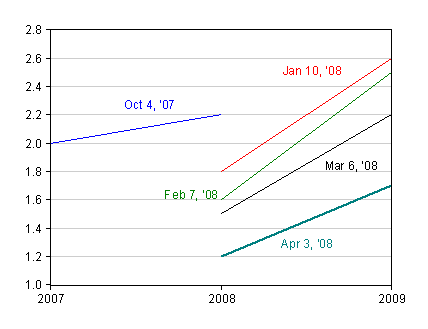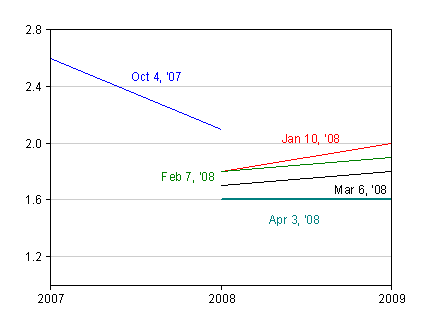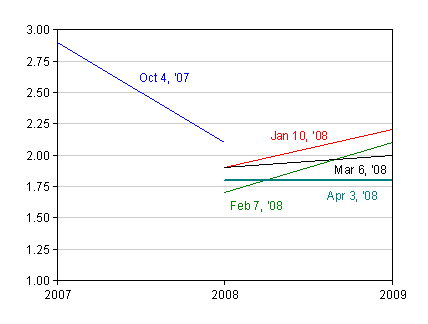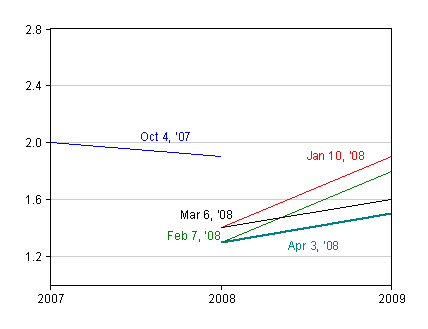The decoupling thesis seems to be ever more out of fashion. From the FT today:
Mr Strauss-Kahn, a former French finance minister, rubbished the notion that the credit crisis was largely a US problem. “The crisis is global,” he said. “The so-called decoupling theory is totally misleading.” Developing countries such as China and India would be affected.
…
The IMF would this week revise down its global economic forecasts to below the current private and official consensus, he said. “The forecasts we are going to release in a few days are not very optimistic. The downside risks we underlined in the last world economic outlook have materialised.”
We’ll have to wait until Wednesday to see the new WEO forecasts, but until then, it might be instructive to see the progression of forecasts from the Economist‘s polls of forecasters. First, the United States:

Figure 1: Mean forecasts of US growth y/y from Economist poll of forecasters.
Notice the big drop in forecasts for 2008 going from October to January. What’s interesting is the continuous decline in forecasts over time. In April’s forecast, the drop is substantial both for 2008 and 2009, suggesting a prolonged slowdown.
The 2008 forecasts for the Euro Area shift downward, but from October to April, only by 0.5 percentage points. This contrasts with the 1 percentage point decline for US forecasts.

Figure 2: Mean forecasts of Euro Area growth y/y from Economist poll of forecasters.
The United Kingdom forecasts exhibit an even smaller decline in 2008 growth rates. However, the 2009 bounceback projected in January has evaporated.

Figure 3: Mean forecasts of UK growth y/y from Economist poll of forecasters.
Finally, Japan’s forecasted growth rates for 2008 have fallen 0.6 percentage points. As in other cases, the slump is now forecasted to be more prolonged than it was in January.

Figure 4: Mean forecasts of Japan growth y/y from Economist poll of forecasters.
One source of comfort — no negative growth forecasted! (Of course, the low values for each forecast of y/y growth are now consistent with two quarters of negative growth.)
Menzie, perhaps a better phraseology would emerge from considering how springs couple to one another.
A very tightly wound spring forces its neighbor to follow closely, while a gently wound spring allows the neighbor to lag. The tightly wound spring tends to have a smaller amplitude of oscillation than the gently wound spring. So, emerging markets and small stocks tend to rise and fall rapidly around the smaller oscillations of the United States.
What happens when one tightly wound spring is going south while all other springs are going north? It’s true that the tightly wound spring may drag the others with it, but also true that they will gain a greater restorative force by being extended from both ends.
The proper terminology is probably not coupled or decoupled. Economies are coupled to the extent that they trade with one another and investment crosses borders. Nowadays, that means that most economies are moderately strongly coupled. The proper terminology probably has to do with being in/out of phase and with the restorative force per unit extension.
I think a lot of coupling/decoupling debate is on developed vs developing countries, not within developed subset. There is quite a consensus that developed countries are more or less coupled when we take the fact that financial market within developed markets are more integrated than the good markets. Many of those bad debt are floating around there. I would guess more of them are in the hand of developed mkt’s hands.
My question is will this financial market turmoil in the developed mkts spill into the developing markets and then spread to the real economy. I guess a better question is will the developing market better cushion this time than in 2001 for example.
Simply amazing how the equity markets have held up considering all of this.
calvin ho: I think the nature of the decoupling debate depends upon the vintage. Earlier vintages, such as the one I discussed in this December 2006 post, do focus upon intra-developed country group decoupling. You are right that, once intra-developed country group decoupling became less plausible, focus shifted to the inter developed/emerging market link.
Charles: I don’t disagree, but as your post demonstrates, the more accurate depiction is hard to summarize in a single word. “Error correction”, for instance, does the trick in part, although outside of the econometrics and engineering audiences, might be a bit obscure.
It’s always worse than expected on the downside.
Thanks Professor. Do you have any opinion on the latter coupling/decoupling debate?
“We’ll have to wait until Wednesday to see the new WEO forecasts”
thanks for tomorrow’s wsj. i got some call options sold on a good chunk of my ira yesterday.
calvin ho: Given that many of the emerging market/LDCs are growing rapidly because of commodity exports, I think one has to pay serious attention to the downside risks to the mean forecast. In particular, since commodities (including oil) are price inelastic, small shifts in demand (which could arise from a recession) could have large implications for LDC export earnings. So, I have little dispute with the mean WEO forecast, but I think the possibility of a more pronounced slowdown in the emerging markets could easily occur.
Regarding the other countries, most importantly China, I think that the forecast makes sense for 2008; post-Olympics, well, we’ll see.
So, divergence for now; convergence, possibly later.